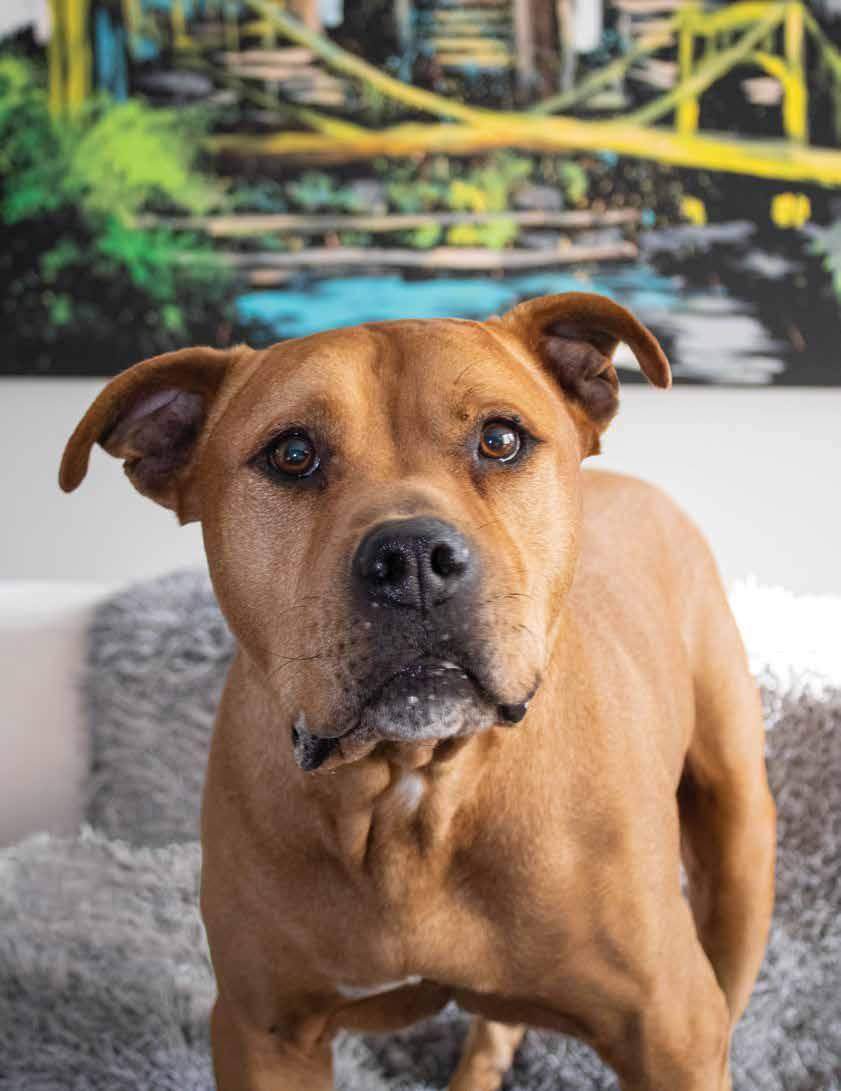
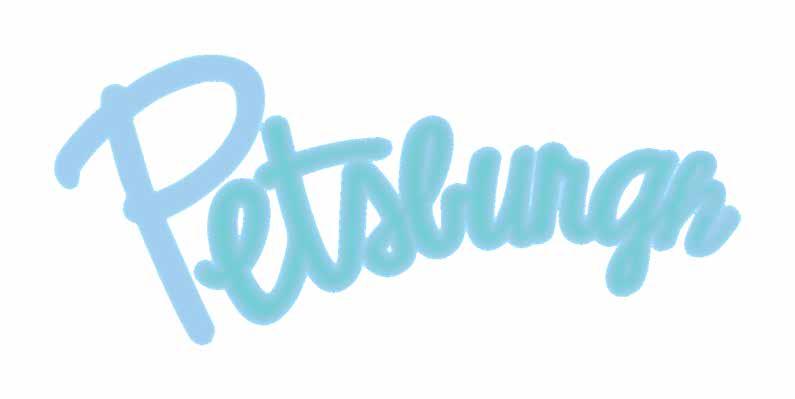

THE HEALING POWER OF PETS Page 11 2022: YEAR IN REVIEW Page 27 THINKING OUTSIDE THE CAGE Magazine Meet our Cover Star: Gator! Page 26 FREE!
Advertising
$200.
Showcase your business to tens of thousands of animal lovers –all while supporting Animal Friends’ lifesaving mission.
To learn more about placing an ad in an upcoming issue of Petsburgh Magazine, contact:

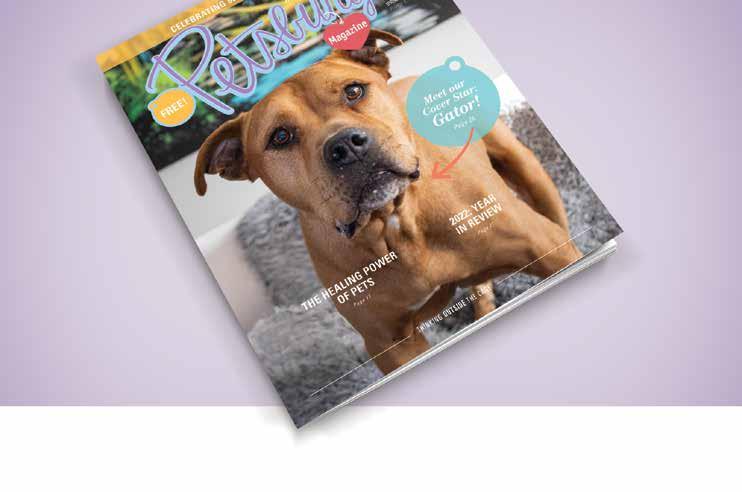
CHoellerman@ThinkingOutsideTheCage.org or 412.847.7072
ABOUT US
For more than 75 years, Animal Friends has continually set – and raised – the bar for humane programming in the Pittsburgh region. Our 75-acre campus serves as a center of compassion and hope for thousands of homeless pets annually. Our full-service companion animal resource community serves our region by providing tens of thousands of affordable services, and impacting more than 100,000 lives through humane education, pet behavior classes, pet therapy and our pet food bank each year. Animal Friends is proud to continue to save lives … simply put, because it’s what we do.
MISSION STATEMENT
To rescue, rehabilitate and rehome animals in crisis, ensure healthy pets through education, advocacy and affordable services, and inspire a community where the animal-human bond is celebrated and nurtured.
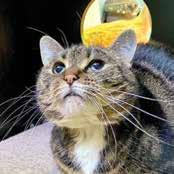
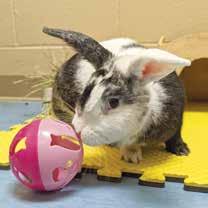
VISION STATEMENT
A humane and compassionate future for every animal friend.
2 Petsburgh Magazine
VISIT US ONLINE ThinkingOutsideTheCage.org
FOLLOW US
Ad in Petsburgh Magazine!
Place an
opportunities starting at
This magazine is not responsible for the conduct, health, temperament or availability of the animals listed. The publisher retains the right to refuse any advertising. COPYING OR REPRODUCING ANY OR ALL OF THIS PUBLICATION IS URGED AND APPRECIATED, WITH THE EXCEPTION OF THE USE OF THE NAME “PETSBURGH MAGAZINE,” WHICH IS PROTECTED AND IS PROHIBITED IN ANY OTHER FORM, OR BY ANY OTHER MEANS.
about special rates for a year-long commitment!
already
Petsburgh
brand new
Animal Friends reserves the right to refuse any advertising due to content or space restrictions. quarter!
Ask
If you don’t
receive
Magazine, sign up for FREE to get a
issue delivered to your mailbox every
Editor-in-Chief: Monique Serbu
Managing Editor: Cody Hoellerman
Associate Editor: Erica Cebzanov
Writers: Kidareo Bayer-Carlos, Kathleen Beaver, Erica Cebzanov, Dr. Donald Consla, Tara Czekaj, Suzanne Denk, Kristyn Miller, Liz Moser, Cecilia Oliveros, Jade Perry, Veronica Rigatti and Lindsay Woge
Photography:
Suzanne Denk, Jamie Greene, Cody Hoellerman, Abby McNatt and Monique Serbu
Design: Kay Braun at Direct Axis
President & CEO: Kathleen Beaver
ThinkingOutsideTheCage.org
Caryl Gates Gluck Resource Center
T-F: 11 a.m.-7 p.m. | S & S: 10 a.m.-5 p.m.
Howard Ash Animal Wellness Center
M-F: 8:30 a.m.-5 p.m.
562 Camp Horne Road Main Number: 412.847.7000
ANIMAL FRIENDS DIRECTORY
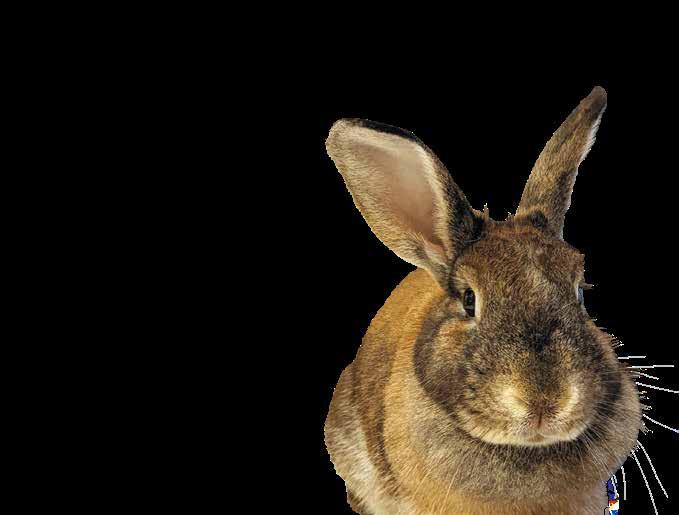

412.847.7002 | AdoptionInfo@ThinkingOutsideTheCage.org
412.847.7078 | AdmissionsInfo@ThinkingOutsideTheCage.org
Advertising, Event Sponsorships, Donations and Mailing List Changes/Additions

412.847.7051 | Development@ThinkingOutsideTheCage.org
Behavior Helpline
412.847.7059 | Behavior@ThinkingOutsideTheCage.org
Community Programs and Classes
412.847.7035 | AFU@ThinkingOutsideTheCage.org
Humane Investigations
412.847.7066
412.847.7073 | SpecialEvents@ThinkingOutsideTheCage.org
Low-Cost Spay/Neuter Program
412.847.7004 | ClinicServices@ThinkingOutsideTheCage.org
Volunteering
412.847.7053 | Volunteering@ThinkingOutsideTheCage.org
4 11 19 26 6 12 24 15 27 8 13 18 21 Breaking Mews Clinic Services Adoptable Dogs Supporter Spotlight Pet Retention Meet Our Cover Star: Gator! Event Calendar Volunteer Highlight Adoptable Rabbits Ask the Behavior Team 2022: Year in Review Enrichment Animal Friends University Adoptable Cats IN THIS ISSUE 28 Magazine
We’re 80!
By Kathleen Beaver, President & CEO

Happy birthday to Animal Friends! This year we are proudly celebrating our 80th birthday. First, a quick history lesson – Animal Friends was founded in 1943 at the height of World War II. Several kindhearted individuals came together to help the animals who were being left behind when their owners were called to serve in the war. In the simplest of terms, they were a matchmaking service with no shelter but plenty of energy and commitment to find these pets homes. And, this spark ignited a whole new way to support, care for and rescue homeless pets.
Animal Friends was founded in 1943 at the height of World War II. Several kindhearted individuals came together to help the animals who were being left behind when their owners were called to service in the war. Now, 80
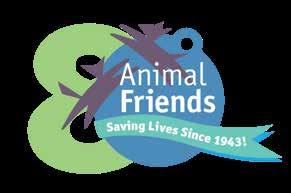
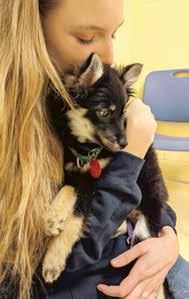
Now, 80 years later, Animal Friends has blossomed into a full-service community resource center focused on celebrating the important role that pets play in our lives while solving big challenges in our community like pet homelessness, lack of access to veterinary care and basic resources, combating animal abuse and neglect and supporting a greater understanding of pet behavior and health needs.
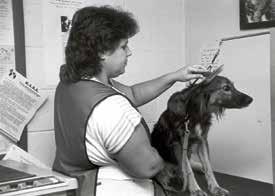
Better than any words I can say, these photos tell our mission story and demonstrate the impact Animal Friends has had in the Pittsburgh region for eight decades.
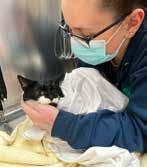


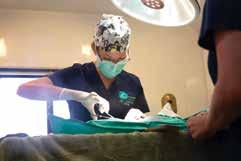

BREAKING MEWS 4 Petsburgh Magazine
years later, Animal Friends has blossomed into a fullservice community resource center...”
This year we are proudly celebrating our 80th birthday.
“
So, grab a glass and join me in a toast to the lifesaving work that together we have made possible …
To our founders for igniting a storm of compassionate change and bucking the status quo,


To our community who stands firmly behind our vision of a compassionate future for every animal friend,



To each of the animals who have passed through our doors and on to a better future.

Here’s to our humble beginnings and our visionary future,
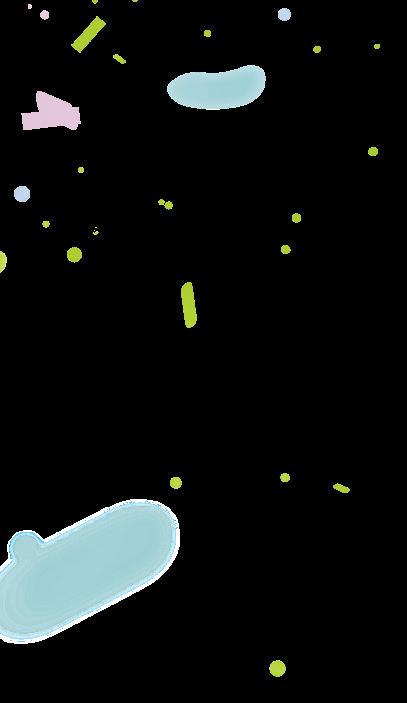
Here’s to our next 80 years!
Cheers!
Kathleen Beaver President & CEO
ThinkingOutsideTheCage.org 5 BREAKING MEWS
Ask the Vet: How Can I Know if My Pet is in Pain?
By Dr. Donald Consla, Lead Wellness Veterinarian
This question is so important to be able to answer as a pet owner. Oftentimes, most of the pain that our pets experience can go unnoticed but not out of negligence. Animals simply communicate in a different way than we do. They think in a different way and factor in different variables to determine their response to discomfort.
You may expect your animal companion to make some audible exclamation if they are uncomfortable like whining, yowling, crying or growling when a specific area is touched. While these vocal responses can happen, it is usually with more significant discomfort. Animals may use more subtle means of communication that suggest they are uncomfortable.
If we consider a wounded animal in the wild, it may help us understand the difference between human and animal communication. If we tell someone we are in pain, we’ll be met with sympathy and additional care. You might take a pain reliever or a family member may drive you to the hospital. A wild animal, however, does not show that they are in pain. If this were the case, predators would know the animal was weakened and they would be at risk. So, what does the wild animal do? They hide and take a break from normal activities or try to do them in a different manner, and
they continue to try to move normally even though this may not be possible. While companion animals have been domesticated for many years, they still have these innate responses when they are in discomfort. For example, if a dog injures

“
their knee, they might try to run but won’t use the affected leg. They will sit with the sore leg underneath their body to protect it. When standing they may look normal but will shift more weight onto the good knee. A cat with chronic pancreatic inflammation which causes an upset stomach may avoid their favorite spot at the top of the cat tree because it is painful to jump up. Or they won’t finish their meal and may hide and urinate outside the litter box.
So how can you tell if your pet is in discomfort? Ask yourself, “If I had these symptoms, would I be in pain or ask for a pain reliever?” If you aren’t sure if your pet is in pain, always consult your veterinarian. The signs of pain in our four-legged friends aren’t always obvious but this article provides you with a different way to look at subtle animal behaviors and determine what they may be trying to tell us!
We thank our spay/neuter sponsors
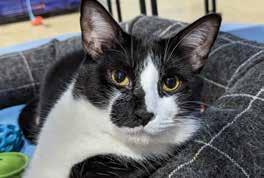
Danita K. Vitek
Edward Baugher
David and Kim Ward
Linda Kavanaugh
Varga
Karen Leslie Coburn
Robert Heinsch
Shirley G. Veahman
Danielle Danzuso
Bednar
Cheryll J. Hanley
Dagmar Jane Gerst
Richard W. Kossum
Joseph Domagala
Sherry L. Haas
Elaine Lowe
Elaine E. Tokosh
Jan A. Carr
Theresa Payne
6 Petsburgh Magazine Enclosed is my sponsorship of ... $65 toward spay or neuter surgeries Other $ Please make checks payable to Animal Friends Name Address City ST Zip Send this form with your donation to Animal Friends, at 562 Camp Horne Road, Pittsburgh, PA 15237. All donations are tax-deductible. Or, make your donation online at ThinkingOutsideTheCage.org/DonateNow. SPONSOR-A-SPAY CLINIC SERVICES
This question is so important to be able to answer as a pet owner. Oftentimes, most of the pain that our pets experience can go unnoticed but not out of negligence. Animals simply communicate in a different way than we do.”
in Cats Chronic Kidney Failure

 By Dr. Donald Consla, Lead Wellness Veterinarian
By Dr. Donald Consla, Lead Wellness Veterinarian
As cats age, there are several diseases that are more commonly seen in this species like hyperthyroidism, diabetes mellitus and alimentary lymphoma, just to name a few. One condition that many are familiar with, unfortunately, is chronic kidney disease.
Chronic kidney disease is a form of kidney failure that takes place over an extended period. Over time, the functional kidney mass is replaced with scar tissue and the kidneys shrink. They are unable to do their job which includes water conservation, electrolyte balance, filtering out toxins and initiating red blood cell synthesis.
Knowing these normal functions helps us determine the clinical signs of chronic kidney disease. Affected cats tend to urinate large volumes because their kidneys are not conserving water. Subsequently, they drink more to try to stay hydrated. Various electrolytes may increase or decrease, and they may become anemic due to a decrease
66% Kidney Failure
SYMPTOMS
• Dilution of urine
kidney trouble so we always need to pair bloodwork with a urinalysis.
SYMPTOMS
75% Kidney Failure
• Increase in BUN and creatinine numbers
over an extended period. Over time, the functional kidney mass is replaced with scar
90% Kidney Failure
SYMPTOMS
• Lethargy
• Vomiting
• Diarrhea
• Dehydration
in red blood cell production. These patients will also have clinical signs secondary to the kidneys not excreting toxins in the urine such as vomiting, poor appetite, diarrhea, bad breath and neurologic signs. One thing to remember is that this disease is slowly progressive, and it can take years to go from the cat drinking and urinating more to losing weight and having GI upset.
Diagnostics can take a long time to change as well. Urinalysis, bloodwork, blood pressure measurement and ultrasound are the most helpful diagnostics to detect this condition. The kidney values on bloodwork can increase for other reasons than just
Typically, we will start to see dilution of the urine when 66% of the kidneys are no longer working. Traditional bloodwork changes like an increase in blood urea nitrogen (BUN) and creatinine will occur when 75% of the kidneys are no longer working. Finally, our feline patients tend to get very sick with lethargy, vomiting, diarrhea and dehydration when 90% of the kidneys are no longer working. Throughout this process, these patients can develop high blood pressure and lose protein in their urine. There is a new blood biomarker (SDMA) that has the potential to detect poorly functioning kidneys sooner than traditional bloodwork.
Treatment is a multi-faceted approach. These cats are put on a prescription kidney diet with lower protein levels which directly helps to reduce some of the toxins that can make the cat feel unwell. We may recommend fluid therapy depending on how sick the patient is, with an IV or fluids under the skin, or some owners may opt to do the latter at home. We can manage appetite, vomiting, blood pressure and protein loss in the urine with various medications.
It is important to have your cat’s blood and urine tested once a year because kidney disease can be caught early and treated long before your cat starts to feel sick. A chronic kidney disease diagnosis can feel overwhelming, but many of these patients do quite well and live long, happy lives.
To schedule your cat’s yearly wellness exam, call our Clinic at 412.847.7004.
ThinkingOutsideTheCage.org 7 CLINIC SERVICES
“
Chronic kidney disease is a form of kidney failure that takes place
tissue and the kidneys shrink.”
Featured Adoptable Dog: Benz

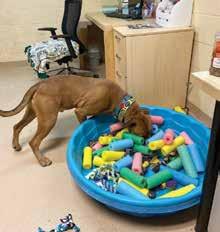
 By Jay Bradshaw, Animal Friends Volunteer
By Jay Bradshaw, Animal Friends Volunteer

Meet Benz, an approximately 3-year-old dog who arrived at Animal Friends last July after his previous owner could no longer care for him. Once he got acclimated to life at Animal Friends, he quickly started to work his way into staff and volunteers’ hearts. The first time I saw Benz I knew that I needed to become one of his friends and spend time with this handsome guy!
Another activity that Benz is obsessed with is riding in the car. The first time my wife and I went to see if he was comfortable with cars he jumped right in my trunk and started searching for spare treats that may have fallen out of my treat pouch. He quickly sat down and was content watching the world go by. Benz also loves riding in the backseat with the windows down so that he can take in all the sights and smells of everything passing by.
One of his favorite places on Animal Friends’ campus is in the Enrichment Suite. Between the sniffing mats, treat puzzles and countless other activities, Benz benefits greatly from this time to exercise his brain muscles. Since Benz is so smart, he’ll need a home with adopters who can continue to keep him occupied both mentally and physically. He is very loyal and wants to please, so continued positive reinforcement on things like leash manners and meeting potential new friends will be critical to his long-term success in a home. He has a strong foundation built from his time with volunteers and staff at Animal Friends, and his adopter will be able to build upon that and form a special bond with him that will surely last a lifetime.
Once Benz warms up to you, he is down for all kinds of fun activities, though he prefers to be the only dog in the home so that he can get all the love! Sitting on your lap for belly rubs? Check! Long hikes in the woods and soaking up the sun? You bet! Playing fetch until your throwing arm feels like it’s going to fall off? Absolutely! One of my favorite things about Benz is that, after a game of fetch in the Play Yard, he always must bury the ball or stick that we were throwing to save it for later. It’s amazing to watch him dig a hole for the ball (or a trench for the stick), carefully place it inside and then use his nose to cover it with dirt and leaves. This is a great metaphor for Benz – playful, intelligent and a little goofy!
Sitting on your lap for belly rubs? Check! Long hikes in the woods and soaking up the sun? You bet!
Playing fetch until your throwing arm feels like it’s going to fall off? Absolutely!”
Benz is looking for a family of adults or a family with older children who can help keep up with his activity and training needs. I know that Benz will be a wonderful dog for the people who end up adopting him, and he is awaiting that family at Animal Friends! If Benz sounds like the dog for you, please contact the Adoption team to find out how to welcome him into your life!
ADOPTABLE DOGS
8 Petsburgh Magazine
“
Rosie’s Rule dogs have been outfitted with GPS-enabled collars from Fi Smart Dog Collar. Animal Friends has teamed up with Fi to provide collars for our canine residents who are at an increased risk of becoming separated from their handler and not being safely reunited. Once outfitted with a Fi collar, Rosie’s Rule dogs will keep their collar after adoption along with a one-year subscription to the Fi App – at no cost to their new family!
Learn more and support Rosie’s Rule



TUX
Meet Tux! This dapper dude arrived at Animal Friends as a transfer from another shelter. Shortly after, he was treated for heartworm and now, Tux is ready to start his new life. He loves car rides and immersing himself in nature. While he needs some work on his basic manners, he is sweet and affectionate. This energetic dog would benefit from continued physical and mental exercise. Tux is best suited for a family with children at least 13 years old. Tux is ready to meet you!
Tux is grateful to Mary Ann Flaherty-Bennett and Joseph F. Barbusio for their support.

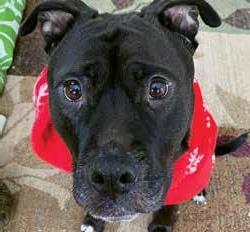
Are you interested in adopting? Visit ThinkingOutsideTheCage.org/Dogs to learn more about adopting from Animal Friends and to meet more adoptable dogs!

SPONSOR AN ANIMAL!
WRIGLEY Ready for a refreshing change of pace? Meet Wrigley! This sweet guy loves walks and interacting with his foster family. He would prefer a home with family members 6 years and older. Although he wants to be your only dog, he wouldn’t mind having a feline sibling. Wrigley isn’t letting his age stop him from finding his perfect match. Do you want to
DIXIE Dixie arrived at Animal Friends when her home was no longer a good fit. This gal isn’t letting her age slow her down! She is sweet, energetic and great at loose-leash walking. She appreciates affection and savors time spent with her favorite people. Dixie needs a quiet, settled home where she can spend her golden years. Could it be yours?
Dixie barks “thank you” to Mary Ann FlahertyBennett for her gift “for Mitzie”.
JAMESON
Meet Jameson! This handsome boy first came to Animal Friends in 2018. We didn’t know much about his past, but based on the scarring on his face, we had reason to believe he was tied up with a rope. He was adopted shortly after arriving and spent several years living in a home. Unfortunately, Jameson’s family was moving and could not take him with them so he’s back to start a new journey. Despite everything Jameson has been through, he still has so much love to give! He is a playful, wiggly boy who can live with kids 13 years or older. Does Jameson sound like the missing piece in your life?
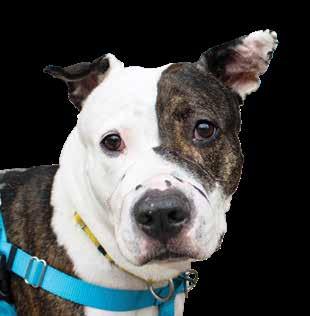

x $100 FOR AN ANIMAL SPONSORSHIP
I would like to sponsor a ... CAT DOG RABBIT
WHOEVER NEEDS IT MOST TOTAL $
Petsburgh Magazine sponsorships are a great way to honor or say thanks to a friend or pet. And, they make perfect gifts! If you would like to sponsor an animal, please complete the form to the right. Send this form with your donation to Animal Friends, 562 Camp Horne Road, Pittsburgh, PA 15237. All donations are tax-deductible. Or, make your donation online at ThinkingOutsideTheCage.org/DonateNow
Name Address City ST Zip
ThinkingOutsideTheCage.org 9
>>
DOGS
ADOPTABLE
I’m a dog! I’m a dog!
LUCILLE Meet Lucille! She first came to Animal Friends in 2020 as a transfer from a partner organization. Lucille was adopted shortly after that and lived in a home until this past summer when she was returned due to changes in her adopter’s work schedule. Now, this 4-year-old gal is ready to find her new family! She loves car rides and using her nose and mind for enrichment activities. Lucille is currently undergoing heartworm treatment, so she will need to be the only dog in her new home to keep her activity level at a minimum. Don’t let this sweet and spunky girl wait any longer!
Lucille would like to thank Sydney Fulton for her generosity.



VOTER
Voter came to Animal Friends on Election Day and she is ready to win your heart! This shy pup seeks a settled, dog-savvy home where she can gain confidence and work on her manners. She would prefer that all of her family members are at least 13 years old. Voter wants to find her voice in your home!


Voter would like to thank Elaine E. Tokosh for her gift.
All of these dogs are generously sponsored by Nancy F. Kenyon in memory of Misty.
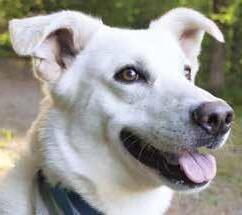
XARA Xara has a new lease on life after arriving at Animal Friends through our Humane Investigations Department. She has demonstrated her intelligence during positive-reinforcement training with our staff and volunteers. Sweet Xara would make a great family pet. Although she would prefer to be your only dog, she may be able to live with a cat. Ready to meet Xara?
Xara thanks Sherry L. Haas for her support.
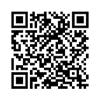
HARRISON Harrison, named after gifted musician George Harrison, came to Animal Friends through our Humane Investigations Department. After spending time in a loving foster home, he is ready to sing a new tune – with a family of his own! Harrison is an easygoing boy who has great leash-walking skills and appreciates nature. This treat-motivated pup loves working on enrichment and basic behavior skills, in between cuddling sessions. He would thrive in a household where children are 13 and older and he is the only dog. Won’t you please “Help!” Harrison find a home? Harrison would like to thank Rebecca Constantakis and Mary M. Smith for their support.
Handsome Gunnar came to Animal Friends after he was rescued from a neglectful situation. He is a fantastic leash walker who uses his nose to assess his surroundings. This intelligent, treat-motivated boy would appreciate continuing his training in his new home. Since Gunnar can be apprehensive about meeting new people, he would like to meet you a few times prior to his adoption. Gunnar may be able to live with another dog, pending a successful meet-and-greet. He would prefer an adult-only home with prior Rottweiler or similar breed experience. Want to get to know this big guy?
Gunnar barks “thank you” to Gloria Baldigowski for her gift in memory of Baxter and Bailey.


Not only do in-kind donations benefit our homeless dogs, cats and rabbits they also benefit the hungry pets whose owners are clients of dozens of our food pantry and Meals on Wheels partners. Through your generosity, we’re able to serve as many pets in need as possible.

10 Petsburgh Magazine
ADOPTABLE DOGS
I’m a dog!
I’m a dog!
I’m a dog!
And, for that, we cannot thank you enough.
The Healing Power of Pets

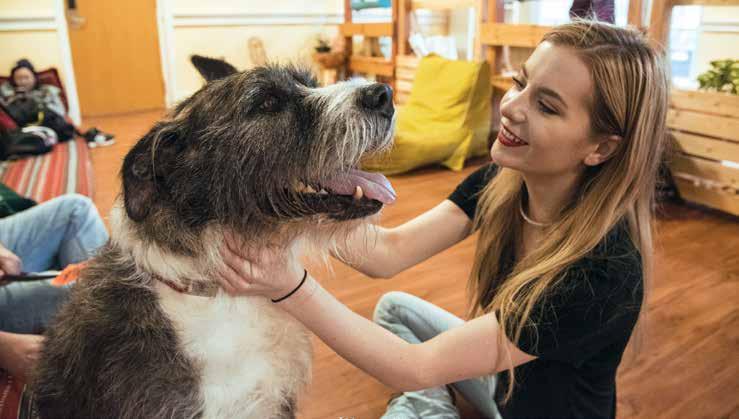 By Cecilia Oliveros, Community Resource Coordinator
By Cecilia Oliveros, Community Resource Coordinator
As mental health has become a focus in our society in the wake of a global pandemic, finding ways to effectively treat and manage it is more important than ever. Mental health issues affect people of all socioeconomic statuses (SES), however they affect those at the lowest SES the most. In fact, many studies show a direct correlation between the two. Those at the lowest SES are two to three times more likely to suffer from a mental health illness than those at the highest SES. Although research around the mental health benefits of companion animals is still in its early stages, there is already plenty of information to suggest that companion animals make a positive impact on those struggling with their mental health.
In a 2018 systematic review titled “The power of support from companion animals
for people living with mental health problems,” they highlighted the findings across 17 studies. One of their findings was that pets provided a needed distraction and disruption from unsettling experiences and symptoms such as panic attacks, suicidal ideation and hearing voices. This is very important for individuals dealing with panic disorders, depression, PTSD and a myriad of other mental health conditions. There were multiple studies that confirmed pets help with a positive identity and sense of self with one owner reflecting, “My best quality is that I love animals and I take care of animals … other than that, I can’t think of anything real outstanding.”
Lastly, the study found that pets offer emotional work to their owners which is work that alleviates worry, provides comfort and mitigates against feelings of isolation and loneliness. This is especially helpful for those struggling with mental health issues who experience isolation at a higher rate than the general public. One owner remarked, “It is very important of people not to feel alone and isolated, and pets help you feel like you’re like everyone else. Not less than other people. My birds are very important to me, and I think other people with other pets feel that way, too.”
At Animal Friends, we deeply value the human-animal bond and include it as a core part of our mission statement. We know that
bond can provide crucial emotional support to those struggling with mental health issues especially those already dealing with systemic poverty. Our Pet Retention team works hard to support these individuals by connecting them to affordable veterinary care at our Animal Wellness Center, needed pet food support through our Chow Wagon Pet Food Bank and other resource referrals for human service needs. We care about the person not just the animal and work hard to holistically help people and their pets!
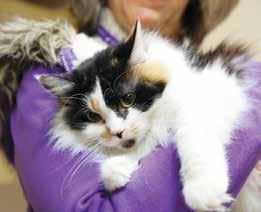
PET RETENTION
ThinkingOutsideTheCage.org 11
Need help? Contact our Pet Retention team at 412.536.3885
“
Although research around the mental health benefits of companion animals is still in its early stages, there is already plenty of information to suggest that companion animals make a positive impact on those struggling with their mental health.”
EVENT calendar
To register or learn more about upcoming events at Animal Friends, visit ThinkingOutsideTheCage.org/Events.
SUNDAY, MARCH 26
SATURDAY, APRIL 15
BOW WOW BINGO
6-10 p.m. | Animal Friends
BUNNY GROOMING
12-2:30 p.m. | Animal Friends
Attention all bunny parents! Animal Friends will be offering appointments for grooming services for your long-eared loved ones. For a $15 donation we’ll treat your bunny to a spa day that includes a nail trim, scent gland cleaning and ear cleaning. Since the average cost of a nail trim alone typically costs about $10-15, this is a deal you simply can’t pass up!
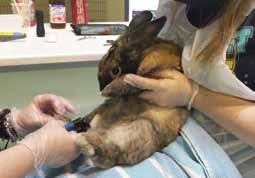
Everyone’s barking about Bow Wow Bingo! Sip and nibble on an assortment of refreshments and appetizers during our cocktail hour followed by a deluxe sit-down dinner. The dogs will have their day – and so can you – as you try your hand at our No Fleas Scratch-Off Game, Chance Auction and Specialty Bingo Games. Of course there will be plenty of time for you to meet the true party animals – our resident dogs, cats and rabbits. And, this year we are celebrating the Year of the Rabbit!
MONDAY, JUNE 12
ANIMAL FRIENDS OPEN
11 a.m.- 6:30 p.m. | The Club at Nevillewood 1000 Nevillewood Dr, Presto, PA 15142
Hit the links at the golf outing that benefits our fore-legged friends! Enjoy golf, food, drinks and prizes with friends, family or colleagues as you spend the day supporting a special cause that will leave your tail wagging.

FRIDAY, MAY 5-SUNDAY, MAY 7

PITTSBURGH MARATHON

Downtown Pittsburgh
Join Team Animal Friends for the Pittsburgh Marathon! New in 2023, we are proud to be recognized as a Steel Level Charity as well as the official partner of the Pittsburgh Pet Walk! Be sure to register as a charity runner for any of the marathon weekend events to represent Animal Friends. And, when you participate in the Pet Walk this year, all proceeds will benefit Animal Friends and the lifesaving work we do each and every day. With each passing mile, you’ll be stepping up your commitment to the homeless dogs, cats and rabbits at Animal Friends. So please, run for their lives … it will make your runner’s high that much more worthwhile.

12 Petsburgh Magazine
EVENTS
Use the QR code to view our Event Calendar!
Featured Adoptable Rabbit:
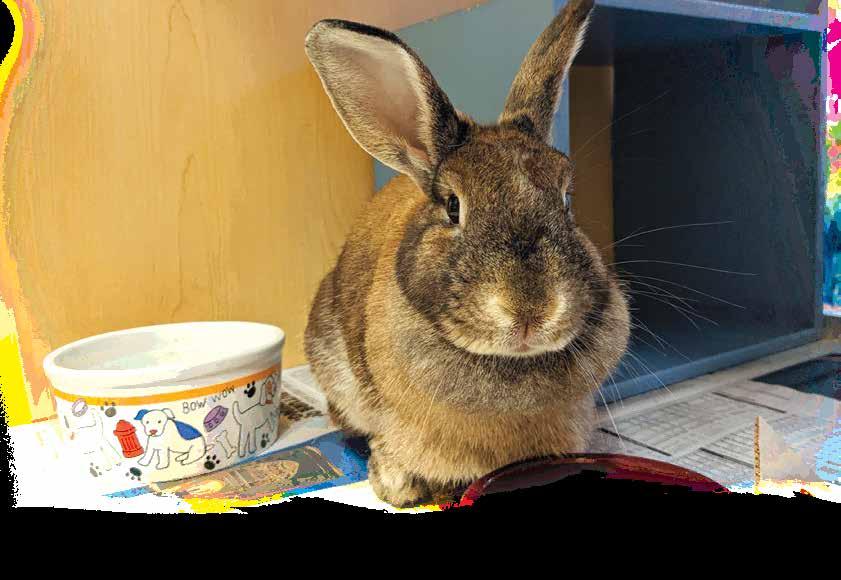
Button
By Erica Cebzanov, Animal Friends Volunteer

As a novice rabbit handler, I will admit to having felt slightly intimidated volunteering at my first few BunRuns, which are free-roam play sessions for the adoptable rabbits to exercise and engage in enrichment activities outside their enclosures. Luckily, a friendly rabbit named Button quickly welcomed me and helped me feel at ease.
A good Samaritan brought Button to Animal Friends last August after finding her as a stray. Despite her background, Button quickly warmed up to the staff and volunteers. At BunRuns, she readily solicits attention and pets by gently nudging human attendees. She demonstrates her contentment by either tucking her legs under her body and relaxing her ears or flopping on her side. She is comfortable with people of all
ages, including the children who attend the BunRuns open to the public nearly every Saturday from 2:30-4 p.m.
While she enjoys down time, she also takes advantage of the exercise and socialization opportunities at BunRuns. This silly bun often attempts to chase and
join her rabbit friends inside cardboard tunnels, often toppling the structures over in the process! Due to her fondness for other buns, she would thrive in a home with a rabbit sibling, as long as proper introductions are made first.
Button is naturally inquisitive, enjoying enrichment stations full of cardboard, paper, wood and hay. At a recent BunRun, she created her own playground by climbing around and inside the cart volunteers use to transport rabbit supplies to events. Her ideal home would provide space for her to safely run and explore.
Interacting with Button has not only been fun, but it has helped me feel more confident working with the other rabbits. Button will hook you with her good looks and personality! Contact the Adoption Department if you think this lovable, outgoing rabbit may be a good addition to your family.
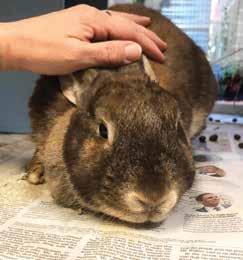
ThinkingOutsideTheCage.org 13 ADOPTABLE RABBITS
At BunRuns, she readily solicits attention and pets by gently nudging human attendees. She demonstrates her contentment by either tucking her legs under her body and relaxing her ears or flopping on her side.”
“
Button will hook you with her good looks personality!and
SAPPHIRA Meet Sapphira! This sweet gal is full of energy and cannot wait to play. Sapphira is an intelligent, treat-motivated bun who loves pets. As an angora, Sapphira requires daily brushing and regular trims to prevent matting. She would benefit from experienced rabbit adopters who understand the importance of proper grooming. Interested in meeting Sapphira? Come to Animal Friends!
Sapphira thanks Denise Coppola for her support.
PHOENIX Phoenix arrived at Animal Friends when her owner could no longer care for her. After working with volunteers on overcoming her shyness, Phoenix has started letting her personality shine. During BunRuns, she takes play to new heights by sitting atop the pet carriers used for transporting the
RAMSEY Playful Ramsey arrived at Animal Friends as a transfer from a partner organization. This energetic bun will need space in her new home for her favorite activities – running, binkying and stretching out for pets. Like all angoras, Ramsey requires daily brushing and regular trims to prevent matting. She can live with children 13 years or older and possibly other animals, with supervised interactions. If you think Ramsey would make a good addition to your family, make an appointment today to meet her!
Ramsey binkies in excitement for Heather Lipinski’s gift.
POSSIBILITY
FRED Fred is a handsome guy who came to Animal Friends when his owner could no longer care for him. He is a laid-back bun interested in relaxation and affection. He has a lot to offer his new adopter! Could it be you?
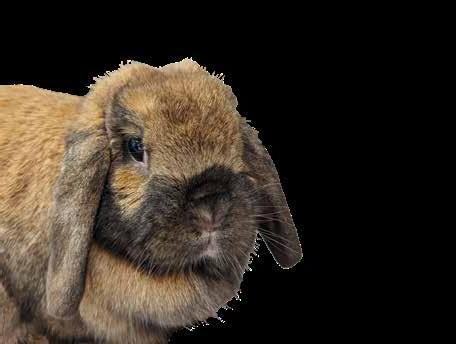

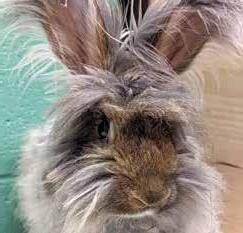
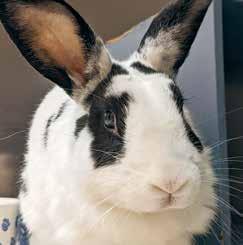
Fred thanks Teresa Zielinski for her generosity.
Imagine the possibility of welcoming this adorable bun home! Possibility was part of Animal Friends’ New Year’s Rescue in which we opened our doors to give homeless animals from local partner organizations a second chance. Possibility is a sweet gal who loves toys and affection. Are you ready to give her the fresh start she deserves?
Are you interested in adopting? Visit ThinkingOutsideTheCage.org/Rabbits to learn more about adopting from Animal Friends and to meet more adoptable rabbits!
Get to know our rabbits by coming to our BunRuns every Saturday from 2:30-4 p.m. where their personalities really shine!
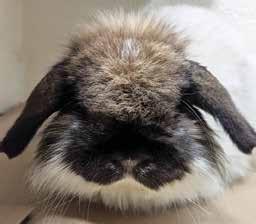
SPONSOR AN ANIMAL!
Petsburgh Magazine
x $100 FOR AN ANIMAL SPONSORSHIP
I would like to sponsor a ...
CAT DOG RABBIT WHOEVER NEEDS IT MOST TOTAL $
Name
Address City ST Zip
sponsorships are a great way to honor or say thanks to a friend or pet. And, they make perfect gifts! If you would like to sponsor an animal, please complete the form to the right. Send this form with your donation to Animal Friends, 562 Camp Horne Road, Pittsburgh, PA 15237. All donations are tax-deductible. Or, make your donation online at ThinkingOutsideTheCage.org/DonateNow
14
Petsburgh Magazine
>>
ADOPTABLE RABBITS
Visiting the Vet
Tips for Decreasing Your Cat’s Stress
By Suzanne Denk, CSB-C, Dip.FBST, Animal Enrichment Specialist
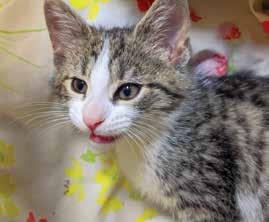
Routine wellness visits to the vet are necessary but can be traumatic for you, your cat and even for other animals at home. Here are some tips to keep the next visit as stress free as possible!
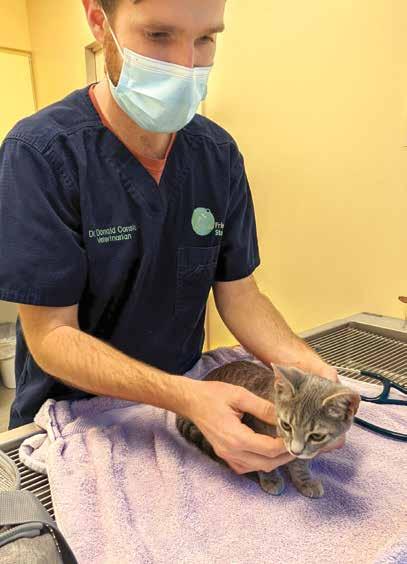
Being comfortable in the carrier is a critical part of keeping your cat’s stress level low. When the carrier comes out, it signals to your cat that something unpleasant is going to happen. Plan ahead and make the carrier a comfortable place by putting it where your cat spends time and by creating positive experiences with it. For tips on carrier acclimation refer to our Spring 2021 issue at ThinkingOutsideTheCage.org/Petsburgh
For the trip to the vet, cover the carrier with a towel to decrease visual stimulation and spray the towel with a calming pheromone like Feliway. Hold the carrier securely from the bottom and do not swing it at your side or let it knock into anything. Playing soft, soothing music in the car on the ride can also help to ease stress!
The vet’s office may have other animals in the waiting area, unfamiliar smells and scary noises. Keep the carrier covered and away from other animals who may be in the lobby. In the exam room, ask if the carrier’s top can be removed and your cat can stay in the base during the exam. If your cat must be removed, ask if they can be placed on the towel from home. Bring special treats to help create a positive experience for your cat. Communicating and working with your vet can help decrease stress for everyone!
When your cat returns home, it is common for other cats in your household to be unwelcoming. This is because your cat
You may not be able to remove all stress but with a little planning, wellness visits can be less upsetting for everyone.
When your cat returns home, it is common for other cats in your household to be unwelcoming. This is because your cat does not smell the same and is seen as a trespasser who smells like the vet’s office! Once your cat has groomed themselves and spent time at home, they will start to smell familiar again. You can help this process by wiping your cat with a soft cloth before you leave for the vet.”
does not smell the same and is seen as a trespasser who smells like the vet’s office! Once your cat has groomed themselves and spent time at home, they will start to smell familiar again. You can help this process by wiping your cat with a soft cloth before you leave for the vet. Wipe their head, cheeks, chin and body and place the cloth in a plastic bag and zip it shut. After the vet visit, wipe your cat again with the scented cloth to help them start smelling familiar again.
When back home, wash or wipe out the carrier and any towels that may have the scent of the vet’s office. Let your cat rest in a quiet space after being such a good patient! You may not be able to remove all stress but with a little planning, wellness visits can be less upsetting for everyone.
And, if possible, have all your household cats on the same wellness schedule.
ThinkingOutsideTheCage.org 15 ASK THE BEHAVIOR TEAM
“
Motivators
By Veronica Rigatti, VSA-CDT, Canine Behavior Specialist
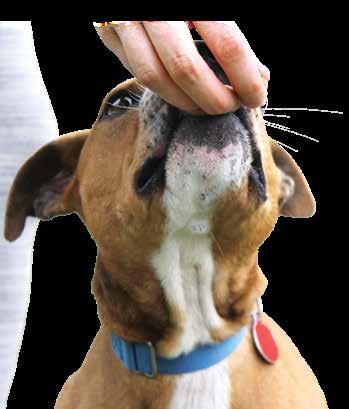
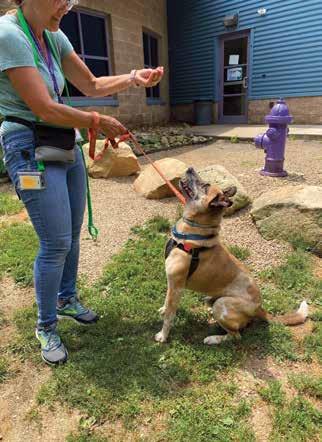
When using positive reinforcement training, you reward your dog for doing a behavior that you like or want. In turn, that good behavior will likely repeat itself. But you need to make sure you are using a reward that is motivating and reinforcing to your dog! You can use food, toys, play, petting or even your attention to reinforce a behavior. Each dog is an individual so what motivates them is going to be individualized as well.
could be the part that is motivating. There are so many kinds of food and treats that can be motivating to dogs. Just as people have their own preference for foods and their favorite treats, so do dogs!
It can be helpful to think of these motivators on a pay scale. Something that your dog gets often, such as their
You can use food, toys,

For most dogs, their number one motivator is food. However, some dogs value toys or petting more. Within each general motivator category, the rewards can be broken down further. For instance, with toys, a ball may be better than a stuffed toy for one dog, but another prefers the stuffed toy. Also, the type of play or game that goes with the toy, like a game of fetch or tug,
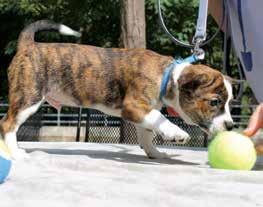
petting or even your attention to reinforce a behavior. Each dog is an individual so what motivates them is going to be individualized as well. For most dogs, their number one motivator is food. However, some dogs value toys or petting more.”
For more behavior help, visit Thinking OutsideTheCage. org/Behavior
kibble, may not be very valuable to them. However, something that is human-grade food, like cheese, may be worth much more. It is important to pay attention to your dog’s response to the reward. Is it motivating enough for them to do what you are asking? If the behavior is new, difficult or they are in a very distracting environment, you will most likely have to use a higher value reward. Essentially, the harder the job is the better the pay should be. Once your dog has learned a behavior and can do it consistently, they shouldn’t need to be paid as often because it will be easy and less valuable rewards and motivators can be used.
Training can be a lot of work, but it should also be fun and rewarding for your dog. Figuring out your dog’s motivators can help advance their good behavior.
For more behavior help, visit our ThinkingOutsideTheCage.org/
ASK THE BEHAVIOR TEAM
“
16 Petsburgh Magazine
play,
Buns and Blooms
By Jade Perry, Behavior Specialist
Got a green thumb? As springtime approaches and the weather warms up, you may want to start thinking about what to plant in your garden or what to pot in your home. If you have a pet rabbit, or know someone who does, you may want to consider planting them some tasty treats this year! Rabbits can eat a variety of leafy greens and vegetables, but did you know they can also eat certain flowers?
A healthy diet for rabbits consists of unlimited hay, fresh greens, some pellets and the occasional fruit. Hay is essential in a rabbit’s diet because it promotes a healthy gut and maintains dental health. Fresh greens offer additional nutrients and also provide moisture in the diet which is good for kidney and bladder function. High fiber pellets provide additional calories, protein, vitamins, minerals and essential fatty acids. Fruits are considered more of a treat and should be given in moderation, as bunnies have a sweet tooth and would choose to eat sweets over their veggies! Just like fruits, flowers can be a tasty treat for your bun to enjoy from time to time.
Rabbits can eat a variety of flowers. You may even notice dried rose petals or mint in some botanical grass mixes you can find at your local pet store. Rabbits can also enjoy these flowers and herbs fresh! As long as the plants and flowers are grown organically, are pesticide- and chemical-free, they are perfectly safe for your pet to consume in moderation.
If you have a pet rabbit, or know someone who does, you may want to consider planting them some tasty treats this year! Rabbits can eat a variety of leafy greens and vegetables, but did you know they can also eat some flowers? Just like fruits, flowers can be a tasty treat for your bun to enjoy from time to time.”

Paired with a balanced diet, the following flowers are safe for your bun to snack on:
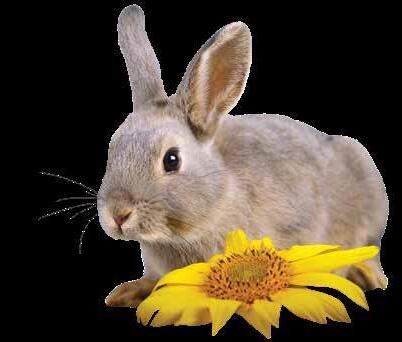
ROSES The leaves and stem are safe to chew, but the petals are especially tasty!
DAISIES The flower, stem and leaves are all safe for consumption. While not the most nutritious, the leaves do provide some extra protein.
SUNFLOWERS These giant blooms are very tasty! Rabbits are safe to eat the flower, stem, leaves and seeds, although they are high in fat. The seeds especially need to be given in moderation or they can cause digestive issues.
MINTS Just the plants and flower (not the candy!).
BELL FLOWERS These are also known as campanula and are completely edible with their leaves being slightly more nutritious.
NASTURTIUM This brightly colored flower is completely edible, even the seeds. In fact, they are so tasty you may want to try them yourself!
LAVENDER Not only calming for you, but for your bun too. It can be enjoyed fresh and dried.
PANSIES This exuberant bloom is completely edible, and another one tasty enough you may want to try yourself.
ThinkingOutsideTheCage.org 17 ASK THE BEHAVIOR TEAM
“
Let Them Sniff!
By Suzanne Denk, CSB-C, Dip.FBST, Animal Enrichment Specialist
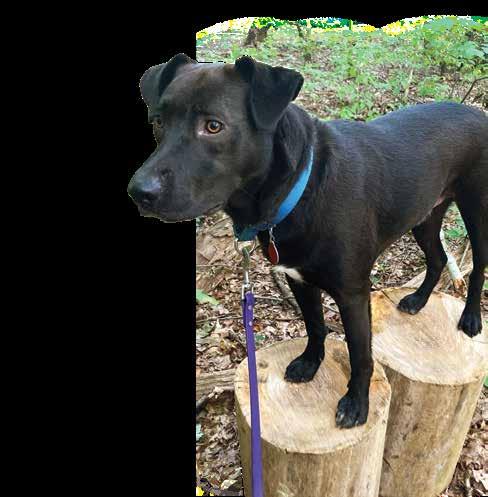
Perhaps the most important enrichment we can provide for our dogs is to let them sniff. That means sniffing every mailbox, lamp post, bush and blade of grass if that’s what is interesting to them. Sniffing fulfills an instinct and simply put, sniffing makes dogs happy! When your dog is pulled away from an exciting smell and not allowed to linger, it can be stressful for them. Smelling is how dogs experience the world and gather information. It also decreases stress and promotes relaxation. There are several ways to give our dogs fun sniffing opportunities. Go on a “sniffari”! Take a walk outside where your dog chooses the direction of the walk and you follow wherever their nose takes them. Or, a hike in the woods is full of wonderful information for your dog to take in through their nose. Take a sensory walk
in a new or unusual place like a parking lot or empty playground. Stay alert to keep them safe but let your dog set the pace and explore new smells and stimuli as they want.
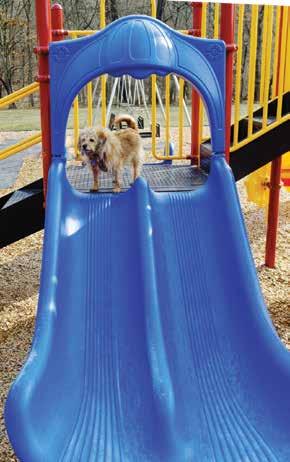
This spring, create a sensory garden in your yard that touches all your dog’s senses. What will they see, hear, touch, taste and feel in the space? You can even create a little sensory garden for your dog on a porch or deck and bring the big outdoors to the space. The sensory garden can include leaves, branches, grass, logs, sand, smooth rocks, wooden wind chimes, straw and a small fountain. Plants like wheatgrass, lavender and catnip may appeal to your dog, too. An herb garden can scent the air just as your dog moves past the plants, but be aware of certain plants in your area and if they are safe for nibbling. You can find a list of safe plants at aspca.org. When there’s no outdoor space, you can create a sensory board or box and bring the outdoors inside for a sensory experience.
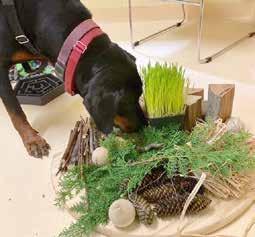
Allowing your dog to sniff is ideal mental stimulation and enrichment. Sniffing allows dogs to do what comes naturally. Slow, quiet time in the outdoors may provide relaxation
sniffing makes
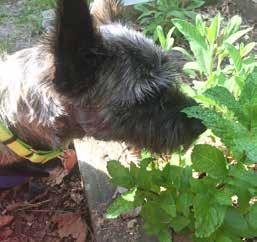
18 Petsburgh Magazine ENRICHMENT
Sniffing fulfills an instinct and
When your dog is pulled away from an exciting smell and not allowed to linger, it can be stressful for them. Smelling is how dogs experience the world and gather information. It also decreases stress and promotes
For more enrichment ideas visit Thinking OutsideTheCage.org/ Enrichment
WELCOME!
Welcome to Animal Friends University, home of the region’s most exciting selection of courses offered for, about and, sometimes, even with your pet.
To view our complete course catalog, visit ThinkingOutsideTheCage.org/AFU
Classes fill quickly, so we encourage you to register online. If you have any registration questions, please call 412.847.7035 or email DKlingelhofer@ThinkingOutsideTheCage.org
Cancellation Policy
If a class/event must be canceled due to insufficient enrollment, refunds will be issued. Notice of cancellation by a student must be received no later than three business days prior to the class/event in order for a refund to be issued.
Weather-Related Class Cancellations
Please check our website’s homepage, ThinkingOutsideTheCage.org or call 412.847.7035 for class cancellation updates during inclement weather.
Dog Socials
For dogs 4 months or older who are both peopleand dog-friendly.

For the schedule please visit ThinkingOutsideTheCage.org/DogSocials
Hiking Hounds
Select Wednesdays and Sundays
KinderPuppy
Training Classes
Puppy Manners
For puppies who have had their 2nd DHP vaccination and are 20 weeks of age or younger. Small breed and/or shy puppies may attend until 24 weeks of age. Our flexible format allows your pup to start class when vaccinated and take advantage of the socialization period. Each class includes puppy playtime, enrichment ideas and skill lessons which go with the class theme – Basic Manners, Around the Home, In the World, Learn to Share and Learn through Fun.
For puppies ages 5-9 months.
Basic training for the older puppy will include household manners, manners for interacting with new people and places and playtime to increase dog-dog social skills. Cues to be taught include sit, down, come, walk nicely on leash, wait politely, drop it and leave it.

Dog Training Class Scholarship
In our partnership with Edgar Snyder & Associates, we are pleased to offer scholarships for AFU Dog Training Classes! To apply for a scholarship, please visit EdgarSnyder.com and then search Animal Friends and let them know how your dog could benefit from an Animal Friends University training class. Scholarships will be awarded quarterly.

Training Fun Single Sessions
Including Leash Manners, Recall Basics, Four on the Floor, Enrichment Essentials and “Magic” Touch Cue
Panhandle Trail (Oakdale), Rachel Carson Trail (Natrona Heights), West Park (Northside) with 412 Brewery!
Bunny Grooming
ThinkingOutsideTheCage.org/ to schedule your appointment!
To participate, your rabbit must be fully vaccinated for RHD.
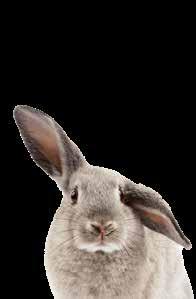
Companion Dog Manners
To register, visit ThinkingOutside TheCage.org/ DogTraining
For dogs who are both people- and dogfriendly and 9 months or older.
This first level class gets your dog started with the cues of sit, down, stay, coming when called and loose-leash walking. Laying a solid foundation with these skills is the key to living happily with your four-legged friend. As well as good manners, class discussions will give you an understanding of why dogs do the things they do to and how to build a strong relationship with your dog.
Bashful Buddies
For dogs who are shy, non-reactive and 6 months or older.
In this five-week class we will explore a variety of exercises to build confidence in your shy/fearful dog. This will include meeting new people, confidence in new situations and making positive associations with vet visits and grooming activities. Space availability is limited.
Register Online! ThinkingOutsideTheCage.org/AFU SPRING 2023 VOL. 5 No.1 Est. 2006 AnimalFriends UniversityUniversity
ThinkingOutsideTheCage.org 19 ANIMAL FRIENDS UNIVERSITY
AnimalFriends UniversityUniversity
The Nose Knows, Level One
For dogs 6 months and older who are both people- and dog-friendly. Dogs should be comfortable and non-reactive in a group class setting. Looking for sport that can be done indoors with dogs of all ages? Want to exercise your dog mentally and physically? Come and find a fun way to channel your dog’s natural talent for sniffing! Scent games are a great way to stimulate your dog while working together as a team. Watch and learn as your dog detects an odor and hunts to locate its source. Have a good time while building skills through new search activities each week.
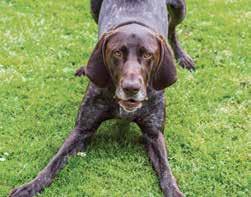
The Nose Knows Continues, Level Two
For dogs 6 months and older who have completed The Nose Knows One classes (or equivalent) and are both people- and dog-friendly. Dogs should be comfortable and non-reactive in a group class setting. Have fun and build on scent work foundation skills with challenging new sniffing activities each week. You and your dog will work as a team doing container, exterior, interior and vehicle searches to locate target odors.
C-WAGS Spring Scent League
Sundays, April 2, 23, 30
Online registration coming soon at ThinkingOutsideTheCage.org/DogTraining
Pet CPR & First Aid
This class will teach you the lifesaving skills and knowledge that will enable you to be there for your pets when they need you the most! Topics include, but not limited to, rescue breathing, bleeding protocols, choking management, heat/ cold injuries, bites, stings, poisoning, seizures, fractures and limb injuries. Class size is limited to 15 students to allow for individualized instruction. Certification provided upon completion of class. Tuition fee includes all training materials, training certificate and light refreshments. A portion of the proceeds from this class benefit the residents of Animal Friends.
Class Spotlight
Saturday Morning Behavior Series
MARCH
Think and Learn Like Your Dog
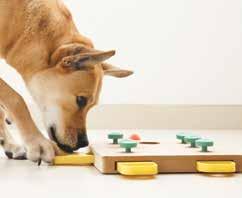
In this session we will review how dogs learn in order to build better relationships in training with our four-legged companions. This class will also cover socialization - what it is and what it is not. We will also review how to properly socialize your puppy during the critical stages or how to work remedial socialization in your adult dog.
Home Alone: Techniques to Manage and Modify Separation Anxiety
Some dogs have difficulty separating from their humans. Dog separation anxiety symptoms can vary from mild to severe. In this session, we will discuss ways to help your dog feel better about “alone time.”
APRIL
The Nose Knows Single Sessions
Including May the Source Be With You and Just Searches
Are You Listening? Your Dog is Speaking to You!

One of the single best things any dog owner can do for their dogs is learn how to listen when they speak silently with their bodies. In this session we will teach you how to “hear”
what your dog is saying through various body language reviewing their words they speak from their nose to their tails. We will dive into the vocals of our dogs looking at their various barks for excitement, warning, fear and frustration barking. As Orhan Pamuk said, “Dogs do speak, but only to those who know how to listen.”
MAY
Unleash the Ways to Your Best Leash Handling Skills
In this session you will learn how to hold your leash like the pros which gives you a leg up in precarious situations such as being rushed by an off-leash dog. We will also prepare you with tips and tricks to keep you and your four-legged friend safe and discuss dog park safety.
20 Petsburgh Magazine ANIMAL FRIENDS UNIVERSITY
the Date!
Save
Est. 2006
Featured Adoptable Cat:
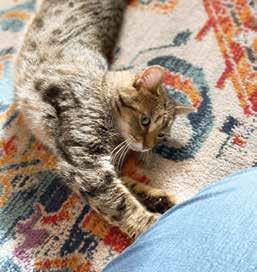
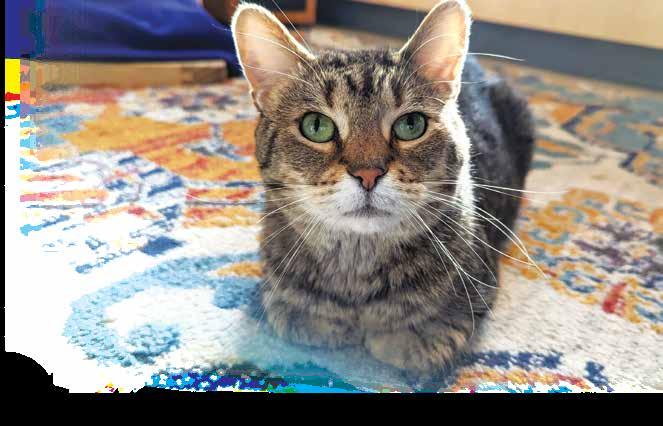
Ryder,
Reformed Bad Boy
By Suzanne Denk, CSB-C, Dip.FBST, Animal Enrichment Specialist
Ryder arrived at Animal Friends as part of a Humane Investigations case and – at first –was not happy to be here, to say the least. He spent his first days hiding securely in his cubby and showed no interest in interacting with anyone.
As time passed, he began to growl, lunge, swat and was not receptive to hands being near his personal space. We were a little afraid of him to be honest and he was very, very afraid of us. With clicker training, Ryder was rewarded for eye blinks, which is a friendly cat greeting, and he quickly learned how to get a treat.
Ryder was moved to a free roam room to live with other cats with the hopes he would become more comfortable. He started out in a large play cage inside the room because he was still aggressing forward, and we were unsure of how he would respond to us in close proximity. While in the play cage, he was rewarded for eye blinks and forward movement without swatting. Then one day, we invited our bad boy out into the free roam room.
Ryder still hid but enjoyed the company of the other cats and could often be found
sleeping next to a friend. He would come out to get treats and play with teaser wand toys, and he was also starting to approach people
but still did not allow petting. Then the room was remodeled, and Ryder moved to an enclosure. Ryder, upholding his naughty reputation, still could not be touched and would aggress forward if an attempt to touch him was made.
We started target training with him which is an excellent foundation behavior and can transfer to other skills such as touching a finger or entering a carrier. Ryder learned that touching the target stick earned him a treat. Over time, the hand on the target stick got closer until Ryder was targeting his nose to a person’s finger and being petted.
Ryder now lives in our Welcome Center’s Cat Cabin where you will often find him up high in a cubby. He will meow in greeting and come down the ladder to visit, but there are still moments when he will start to raise a little paw to swat but he quickly lowers it. You can almost see him thinking that he’s safe and no swatting is necessary! While each person must earn Ryder’s trust, he allows his friends to pet him and solicits their attention. His friends would even call this reformed bad boy very sweet. Ryder is an incredibly intelligent cat who loves to play with teaser toys – which is a great way to build a bond with him! Ryder is also one of “Yana’s Special Felines”, which means that his requested adoption donation is underwritten, and his new family will receive a starter kit of supplies and other support based on his unique needs. Come and meet Ryder today!

ThinkingOutsideTheCage.org 21
“ ADOPTABLE CATS
We started target training with him which is an excellent foundation behavior and can transfer to other skills such as touching a finger or entering a carrier. Ryder learned that touching the target stick earned him a treat. Over time, the hand on the target stick got closer until Ryder was targeting his nose to a person’s finger and being petted.”
Meet Narwhal! He first came to Animal Friends as part of a Humane Investigations case with a number of other cats, affectionately known as the N Cats. When he first arrived he was shy and timid, but after socializing with staff and volunteers on a daily basis, he has started to show his true personality! We’ve found that he can be affectionate on his own terms, and he loves treats. Despite not having a horn, Narwhal is as magical as ever! Does he sound like a good fit for your family?
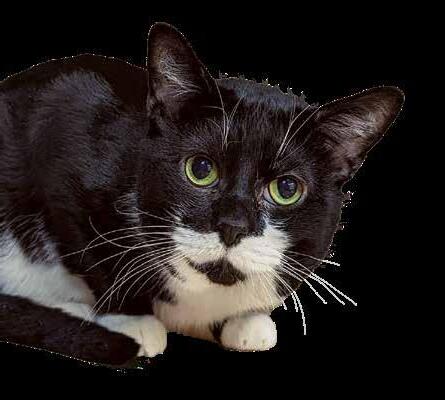
Narwhal would like to thank Jan A. Carr and Audrey J. Amthor for their generosity.
home was no longer a good fit. Sassy enjoys playing with shoelaces and teaser toys. When she is in the mood to relax, she likes people to pet and brush her. Sassy eats a special diet to keep her feeling her best. This sweet and sassy cat wants to be your only feline, so she can receive all of the love and attention for herself. Sassy is ready to meet you!
Sassy meows “thank you” to Melanie
GALLAGHER Gallagher came to Animal Friends after he was rescued with a group of cats from a neglectful situation. This shy guy doesn’t need to be the center of attention – he just wants to spend time with you and another cat in his new home. He even has experience as a work-from-home supervisor during his time in a foster home! In his downtime, he enjoys long naps in the sun and snuggling with feline companions. Are you ready to meet Gallagher?
Gallagher is grateful to Audrey J. Amthor and Jan A.
Are you interested in adopting? Visit ThinkingOutsideTheCage.org/Cats to learn more about adopting from Animal Friends and to meet more adoptable cats!
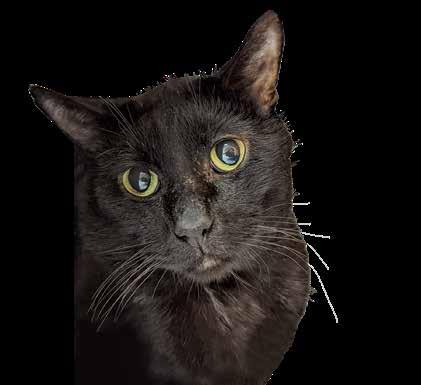
SPONSOR AN ANIMAL!
x
Woah Nellie! This handsome gentleman came to us from a home that simply had too many cats, so he’s now enjoying some respite from the crowd while he looks for his new home. He is a very shy guy but has been working on gaining confidence with staff and volunteers. Nellie will come to his door for finger sniffs and treats as long as nobody moves too quickly. His new family will need to give him regular play sessions and lots of positive reinforcement to help him continue his progress toward becoming a companion. Nellie would be happiest in a quiet, cat-savvy home where he can adjust at his pace while being given all the love and a nice place to nap. He might be able to live with another friendly feline, given the proper introductions. Come and get to know Nellie today!
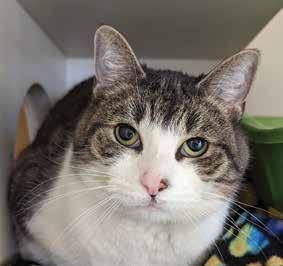
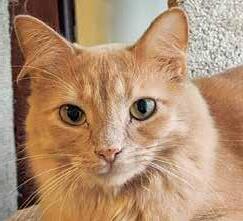
Nellie meows “thank you” to Susanne Young for her support
$100 FOR AN ANIMAL SPONSORSHIP
I would like to sponsor a ... CAT DOG RABBIT WHOEVER NEEDS IT MOST TOTAL $
Name
Address City ST Zip
Petsburgh Magazine sponsorships are a great way to honor or say thanks to a friend or pet. And, they make perfect gifts! If you would like to sponsor an animal, please complete the form to the right. Send this form with your donation to Animal Friends, 562 Camp Horne Road, Pittsburgh, PA 15237. All donations are tax-deductible. Or, make your donation online at ThinkingOutsideTheCage.org/DonateNow
22 Petsburgh Magazine
>>
To help these special cats find the right families, their requested adoption donations have been underwritten and each of them will be sent home with an individualized starter kit of supplies and other support based on their
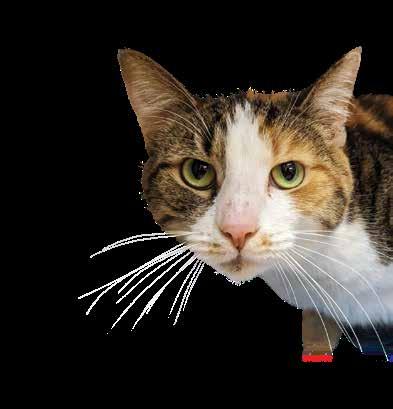
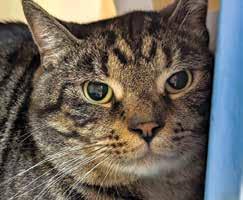
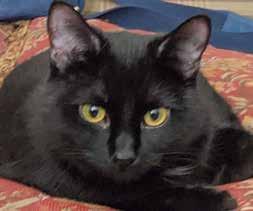
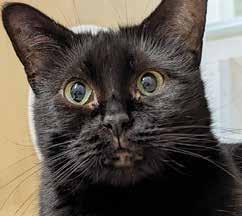
Use
YODLE Life is a song worth singing when Yodle is a part of it! Yodle came to Animal Friends when her previous owner could no longer care for her. This cute kitty was timid and fearful when arriving at Animal Friends and has spent time in a foster home to help her open up. Although still shy, Yodle will let her personality sing over time, especially if you have treats on hand! She loves jingly teaser toys and pets, but she will let you know when she has had enough. Yodle may be open to having a feline sibling, if given the proper introductions. Does Yodle sound like the perfect match for you?
Yodle meows “thank you” to Sandra L Kerr and Karen J. Courson for their support.

EMERALD
Emerald is a shy girl who is still working on her comfort level with humans, but with the right amount of time and patience, she will show you her sweet side! Once she gets to know you, she will also be the first to ask for pets. Emerald is hoping for a home that will allow her the time to adjust and help her build confidence through enrichment and positive reinforcement. She also loves treats, so that is a great way to become her friend!
Emerald meows “thank you” to Sandra L Kerr for her gift.
MACARONI Macaroni arrived at Animal Friends when she wasn’t getting along with her family’s resident cats. In her new home, she wants to be the big cheese and soak up all of the love and attention for herself. Are you Macaroni’s special match?
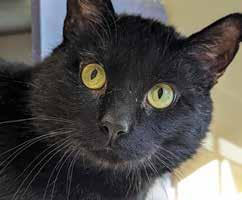
Macaroni is grateful to Vivian Krawtzewicz and Sandra L. Kerr for their generosity.
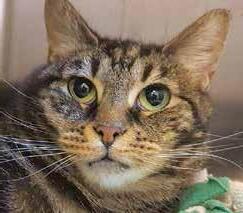
WONDER Wonder came to Animal Friends through our Humane Investigations Department. Volunteers are working on gaining this shy guy’s trust as he adapts to his new surroundings. Wonder needs a calm, settled home where he will have time to adjust at his own pace. Can you imagine your life with Wonder?
Wonder would like to thank Melanie Ann DeBoer for her gift.
JUNEAU Juneau is a handsome sight to see! He is a unique cat seeking a patient adopter who will spend time getting to know him. During his time at Animal Friends, Juneau has worked daily with staff and volunteers to build confidence around humans through play and target training using treats as motivation. Juneau may be able to live with other cats if slow, proper introductions are made. He seeks an adult-only home with people who will respect his boundaries and give him the space he needs to feel comfortable. Ready to visit Juneau?
NIGHTWING Meet our superheroine Nightwing! This sweet girl was brought to Animal Friends by our Humane Investigations team. Since then, she has made great progress with volunteers on overcoming her shyness. Her new family should use positivereinforcement training with treats and regular play sessions – she loves teaser toys! – to gain her trust. Nightwing is seeking a settled, cat-savvy home where she can adjust at her own pace. She may be able to live with a feline sibling, with the proper introductions. Are you ready to assume the persona of Nightwing’s hero? Nightwing would like to thank Susanne Young for her gift in memory of Snookie.
ThinkingOutsideTheCage.org 23
ADOPTABLE CATS
the QR code to learn more about Yana’s Fund.
What Volunteering
Means to Me...
By Kristyn Miller, Volunteer Program Manager
According to the Meriam Webster dictionary, a volunteer is “a person who voluntarily undertakes or expresses a willingness to undertake a service.” For the 1,945 active and dedicated volunteers at Animal Friends, being a volunteer means so much more than simply undertaking a service. When our volunteers were asked to explain their own, personal meanings behind their volunteer service, we were flooded with a variety of heartwarming stories of years of dedicated service to an organization, that to many, feels more like a home.
“ Volunteering is a lifeline for me. I was [a] professional pet sitter [and] dog walker for four decades, until I was struck down with MS. I chose to close my business because I did not want to risk any animals’ life due to my inability to do certain things physically because of the MS. The ability for me to volunteer and share my wisdom and help others helps save my sanity, and I am grateful for that. I’m also quite honored to be part of such a stellar organization that provides a world of good for everybody, both animal and human.”


“ What volunteering at Animal Friends means to me … is the ability to make a positive difference in the lives of the most helpless of creatures. I love being able to be part of a group of individuals who have dedicated their lives to better the lives of animals. I love seeing these animals flourish, to heal, to trust, to welcome us into their worlds and to allow us to care for them. And the very best part? For me, it’s when they find their forever homes.”
“ I have been a volunteer at Animal Friends for [over] 13 years as a dog handler because it makes my life better. When walking dogs, my world centers around the dog at the end of my leash, what they are doing, where they are going – or not going! –
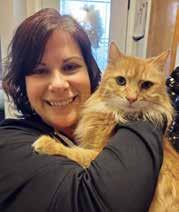


“ Volunteering at Animal Friends gave us the opportunity to help dogs that have been forgotten. The time we share with them is precious and rewarding. To see them walking and exploring is priceless. It also gave us the opportunity to meet and then adopt Confetti (now Bugsy Segal). He is a wonderful addition to our family and has helped fill the void after losing our Bengal mix, Oscar, of 13 wonderful years.”
and how they are reacting to the environment around them. For those precious minutes my troubles and worries fall away and my world is the dog. In 2021 I lost my daughter Alicia and last year I lost my beloved fiancée Sharon, and handling dogs pushes those sorrows aside for me, even if only for a short time. In fact, much of the time at the shelter I feel closer to them, especially when handling certain dogs. I also savor the friendship and camaraderie with my fellow volunteers and staff members as we work for the betterment of the animals. When I put my leash and lanyard in my car after my session is done, I am smiling, knowing my life is better because of the time I spent volunteering that day.”
“ Volunteering with Animal Friends is my labor of love. As a cat handler, it makes my day when I am able to help a scared cat come out of [their] shell and become more adoptable. My very favorite volunteer activity is [fostering]. I foster kittens and momma cats with kittens. I love watching my babies grow and learn to become fabulously wonderful kittens ready for their forever homes. It’s my soul work.”
“ Volunteering as a foster means opening space at the shelter, showing an animal what it feels like to have a safe home and a family, while teaching love and respect for animals as well as responsible pet ownership to my children. It’s truly brought joy to our life!”
24 Petsburgh Magazine VOLUNTEER HIGHLIGHT
Mary Ellen A.
Paula W.
Kristy H.
Will D.
John S.
Debbie V.
Sarah K.
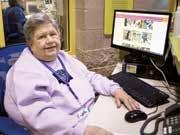
“ To me, volunteering is a way to spread joy. These past [three] years have been some of the most difficult times for many people of all ages (myself included), and the importance of being there for each other should be a top priority. Volunteering [for] Therapets with my Golden Retriever, Kobie, allows me to bring smiles to peoples’ faces when they are down, ease anxiety when people are overwhelmed and educate the public about how special animals are. I cherish every moment when I can volunteer, and I am forever grateful for Animal Friends and Therapets.”
“ I have always had a dog, a big dog, but as my disability grew worse it was not fair for me to adopt another one. I missed having a dog so much that I decided to try volunteering at Animal Friends. Surely there was something I could do. I became a Greeter. I pick out a dog from our website and I make [them] “mine.” I follow [them] up until “my” dog gets adopted then I pick another to be “mine.” This helps fill my need. While I can no longer physically do anything for the dogs, I like to believe that I can help to make each visitor’s experience at Animal Friends just a little more pleasant with a smile and a friendly welcome.”
“ Volunteering as an Engagement Specialist in the Humane Education & Engagement Center provides an amazing pathway for me to share my passion for animals and compassionate animal care with young faces. I love and cherish the opportunity I am given to build the next generation of animal advocates in the community!”
Kate Y.
“ As a volunteer, time spent volunteering has healed me in a way that I can only express with great gratitude. No-kill shelters like Animal Friends are truly the humane shelters. They are not without their own concerns but that is why it is important to still be a volunteer. Volunteers can express their care in many ways. It is not only rewarding for the animals but also for those who have a heart to mend.”
While volunteering may look differently from person to person, our volunteers are united in their selflessness, compassion and pure joy they receive from helping others. As Ghandi once said, “The best way to find yourself is to lose yourself in the service of others”… even if the service is for our four-legged friends. Interested in becoming a volunteer at Animal Friends? Visit our website to learn how to get involved at ThinkingOutsideTheCage.org/Volunteer.

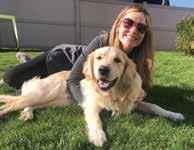
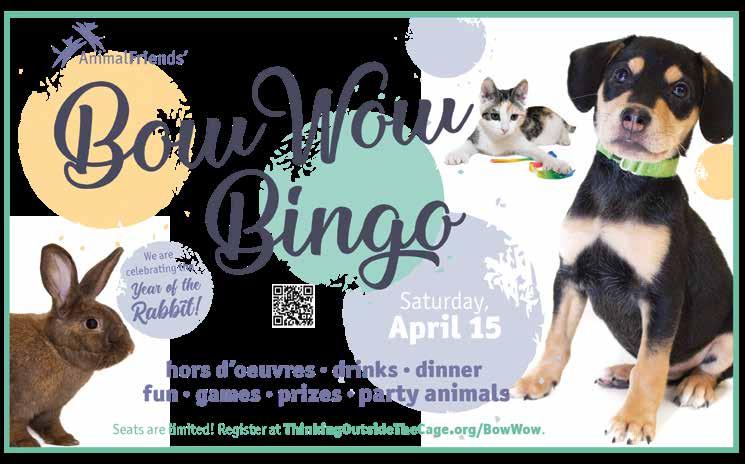
ThinkingOutsideTheCage.org 25 VOLUNTEER HIGHLIGHT
Karen L.
Charlene C. E.
Meet Our Cover Star:
Gator!
The second of two winners of our cover star auction item at last year’s Black Tie & Tails was Kevin McCluskey, who is no stranger to getting the opportunity to have his beloved pet’s face showcased to the public! Gator, a handsome brown-haired boy who was rescued in southwest Virginia from living life on a chain, was also the spokesdog for last year’s Alley Up event!
Get to know Kevin, Gator and the rest of his four-legged family:
Tell us about your pets:
I currently have [four] – two cats and two dogs. I have had [my] two cats, Fiona and Mayhem, for 12-14 years. Both cats came to [me] from friends who could no longer care for [them] for various reasons.
My two dogs are Alli and Gator. Gator rescued me on March 27, 2021 [when] I was going through a rough time. I had recently gone through some transitions in both my personal and professional lives and had recently lost Harper, a rescue dog from Humane Animal Rescue. [Gator came to me through] the sister of a friend from work who was a vet student at Lincoln Memorial University and also volunteers at a local animal rescue. [She met] Gator and thought we would be a match.
Alli came to me through a friend of a friend. Alli’s human mother had passed away unexpectedly. My friend asked me to rehome Alli so that she wouldn’t be surrendered to a shelter.


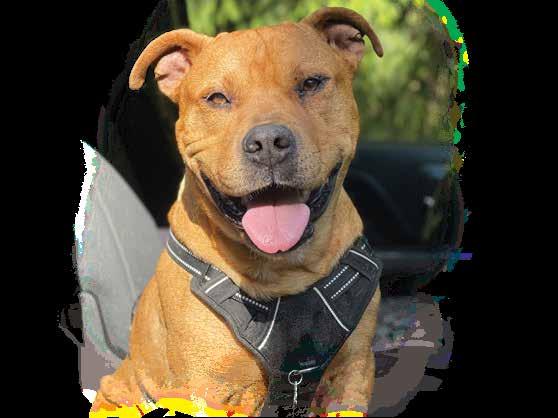
Tell us about Gator … what makes him unique?
Gator (and Alli) love meeting people and getting attention from [everyone]. [Gator] loves to meet and greet anyone he encounters on our walks throughout the North Side. I think
he thinks he is the mayor of the North Side out meeting his constituents. Both he and Alli love to cuddle and be the center of attention. Alli and, especially Gator, enjoy visiting local businesses on the North Side like Allegheny City Brewing, The Garden Café and East Street Beer Distributor that are dog friendly and are happy to shower them with treats.
Why is Gator so special to you? Any particular stories you’d want to share?
The main thing that makes Gator so special is that he was there for me and helped me get through some difficult times. Also of note, Gator was the spokesdog for last year’s Alley Up with Animal Friends. This past year I bid on Alley Up in the hopes of winning so Alli could be the spokesdog for this year’s event. Unfortunately, I was outbid. That’s the reason that I have some guilt that I did not make Alli the subject of this article (she can be very jealous).
The second of two winners of our cover star auction item at last year’s Black Tie & Tails was Kevin McCluskey, who is no stranger to getting the opportunity to have his beloved pet’s face showcased to the public! Gator, a handsome brown-haired boy who was rescued in southwest Virginia from living life on a chain, was also the spokesdog for last year’s Alley Up!”
Why do you support Animal Friends and would you encourage others to do the same?
I have supported different animal charities for years. I remember going to the Best Friends Ball for Humane Animal Rescue years ago [and] I have been supporting Animal Friends for years. Although I had pets growing up, I don’t think I had the passion for charities such as Animal Friends until the past 5-10 years. I think a major factor in my transition/evolution was when I adopted Harper from Humane Animal Rescue in January 2015. I never knew I could love an animal as much I loved Harper [and] she [has] a memorial bird bath and bench on the Animal Friends campus. She changed how I perceived animals from pets to soulmates. Another major factor that changed my perception on animals, dogs and Pit bulls was the documentary “The Champions” about Michael Vick’s dogs and how they were rehabilitated and overcame trauma after they were rescued. I contribute routinely to Best Friends Animal Society after watching this documentary and have continued to contribute to organizations like Animal Friends that promote animal welfare and work tirelessly to save animals like Harper and Gator.

26 Petsburgh Magazine COVER WINNER
“
By the Numbers
Our lifesaving work touched more than 200,000 animal and human lives in 2022 as the need for our programs and services grew significantly. Because of you and your commitment to our mission and vision of a humane and compassionate future for every animal friend this past year, Animal Friends …
Improved 2,056 lives through 551 Humane Investigations cases
Rescued 1,744 animals through transport and admissions while matching 1,676 pets with adoptive families
Strengthened the animal-human bond for 3,701 pets and families through positive reinforcement training during Animal Friends University classes
Touched 59,430 lives through the healing power of our Therapets pet therapy teams
Referred 1,120 pets of financially struggling families to lifesaving resources and support through Friends for Life
Supported 784
Served 550 veterans and active military members through specialized adoptions and other supportive resources
Positively impacted 96 percent of the animals who came through our doors through successful placements
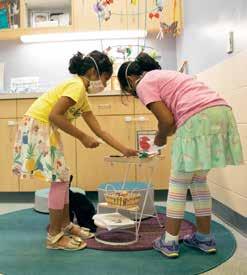
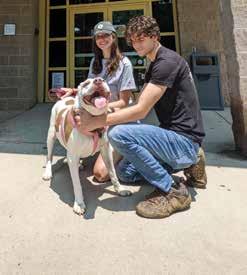
Educated 3,082 young animal lovers about the importance of humane and compassionate treatment of animals
Engaged 844,352 visitors to our website and created 8,329,334 impressions on social media while sharing our vision with the community
foster
animals by providing temporary homes … 110 of which turned into permanent adoptions

Provided affordable and accessible resources including spay/neuter, vaccines, wellness and specialized procedures for 41,395 animals and the people who love them
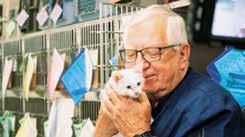
Distributed 181,234 pounds of free pet food to support 27,542 pet owners who had fallen on hard times
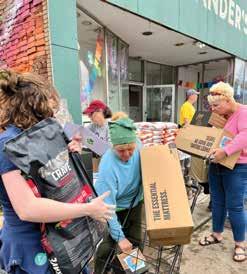
Raised $7,410,279 to support our mission while directing 87 cents of every dollar toward lifesaving care, programs and resources
Contributed 336,459 volunteer hours of service toward our lifesaving mission
ThinkingOutsideTheCage.org 27 2022: YEAR IN REVIEW
A Legacy of Compassion
By Liz Moser, Development Coordinator
If you have visited Animal Friends’ campus, you have surely seen our signs hanging proudly, designating our shelter as the Caryl Gates Gluck Resource Center.
The Resource Center was named in honor of the late wife of Lloyd Gluck, a longtime supporter of Animal Friends and a fierce animal advocate.

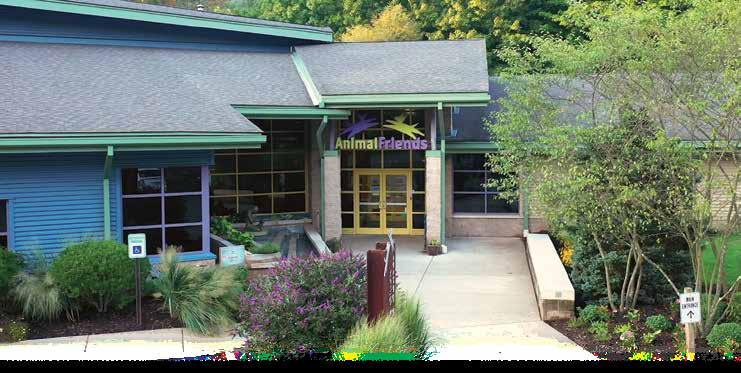
Mr. Gluck’s love of animals started in his childhood with his first pet, a collie named Dorothy. While Mr. Gluck and Caryl, and later Mr. Gluck’s second wife, Virginia, treasured their pets, they also had a vision of a more compassionate future for animals, the people who love them and the community as a whole.
It was this shared vision that brought the Glucks to Animal Friends and started a long and beautiful relationship built on shared values and a deep commitment to companion animals. Mr. Gluck put his support behind our mission wholeheartedly beginning in the 1950s with a donation to help pay for a new roof for the shelter. An attorney by trade, Mr. Gluck remained an active supporter and advisor over the years, fundraising for Animal Friends and donating his legal expertise as a member of the organization’s advisory board. Mr. Gluck joined the Animal Friends Board of Directors in 2000 and was on the forefront of planning our current campus. With a bold dream to change the way an animal shelter
can serve the community, Mr. Gluck led the charge with a generous donation to build a unique center to house our lifesaving efforts. Thanks to his gift, that dream became a reality.
Since the Caryl Gates Gluck Resource Center opened in 2006, tens of thousands of animals and people have passed through our doors and been touched by our work. When Mr. Gluck passed away in 2011, the world lost a kind soul and a tremendous animal advocate, and Animal Friends lost one of its most passionate supporters.
However, Mr. Gluck’s legacy of generosity and compassion lives on – not just through our shelter building or numerous tributes around our campus, but through his charitable trust. Since 2014, funds from the Lloyd E. Gluck Charitable Trust have supported our lifesaving efforts and carried on the vision Lloyd Gluck had for our community. Funds from the trust have supported numerous programs and initiatives at Animal Friends over the years. The trust has been instrumental in supporting our transfer program, allowing us to work with small rural shelters and organizations in other states to give their residents a new lease on life here at Animal Friends. Funding from the trust has also allowed us to expand the services offered by our Chow Wagon Pet Food Bank, allowing us to serve even more families and keep more pets in their loving homes. From supporting the care and enrichment of our residents to expanding programs and services, we are grateful for the support of the Lloyd E. Gluck Charitable Trust, as well as the many other charitable trusts and family funds that support our lifesaving mission.

28 Petsburgh Magazine SUPPORTER SPOTLIGHT
I hope people can see in this building what I see so clearly. This is more than just a shelter. It is more than just a resource center. It is a place that will demonstrate a love of animals, a love of people, a love of the community in which we live.”
– Lloyd Gluck
“
Humane Legislation Wins
Next Steps and How You Can Help
By Tara Czekaj, Animal Friends Humane Legislation Committee Member
The Pennsylvania General Assembly 20212022 Regular Session ended on December 31 with several wins for animals, but there is still a lot of work to do – both at the state and local level.
At the local level in the state, Allentown, in Lehigh County, helped to bookend the state on several animal protection issues.
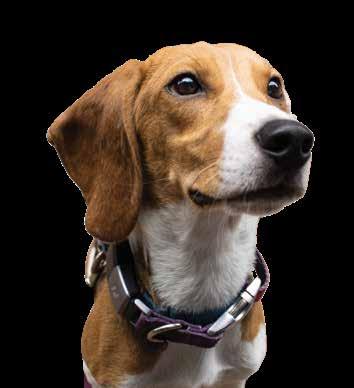
• Allentown passed an ordinance to ban the sale of puppies, kittens and rabbits in pet stores. Allentown is the third largest city in Pennsylvania, which means advocates have closed the three largest mill markets in Pennsylvania – Philadelphia, Pittsburgh and now Allentown.
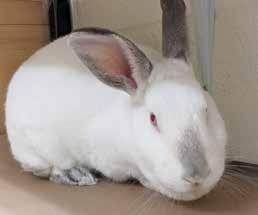
• Allentown also joined the City of Pittsburgh in banning the declawing of cats

As animal protection legislation advocates turn their attention toward working with a new administration in the 2023-2024 state legislative session, there are several priority issues in Pennsylvania. These include:
• A Pet Retail Sales bill (aka “Victoria’s Law”) that would drive the pet market to humane sources and help to protect pets and consumers. Along these same lines, the Humane Society of the United States plans to reintroduce legislation to prohibit pet stores from financing the purchase of a dog or cat.
• Ending senseless live pigeon shoots.
• Policy action to increase access to veterinary telemedicine to address gaps in service and better serve pets and their people more equitably.
• Discussing proposals to help dogs suffering in labs by ensuring adoption opportunities, restricting breeding of dogs for research and increasing investments in non-animal research methods.
Pennsylvania had several policy wins in the last session.
• The Modified Fireworks Law will require fireworks users to provide a written notice to animal housing facilities within 72 hours of discharging fireworks within 150-300 feet of their property.
• Titan’s Law, named after a police dog who died in the line of duty, set up enhanced penalties for police animals who die or are injured by criminals in the commission of felony crimes. It will also allow EMT personnel to provide aid and transport to the injured animal without risk of liability.
• Urging the Pennsylvania Game Commission to initiate a rule to ban Wildlife Killing Contests in the Keystone state, as other wildlife commissions have done.
Individuals looking to help advance animal protection legislation in their own community and at the state and federal levels can join our Humane Volunteer Policy Leader program by emailing policyvolunteer@humanesociety.org.
ThinkingOutsideTheCage.org 29
HUMANE LEGISLATION
We look forward to partnering with legislators and organizations like Animal Friends to advance humane legislation in Pennsylvania, both at the state and local level.”
“
– Kristen Tullo, Pennsylvania Director of the Humane Society of the United States
Join our Humane Volunteer Policy Leader program at policyvolunteer@ humanesociety.org
Hands On or Hands Off? Thoughtful Touch Helps a Child’s Friendship with Pets Take Flight

Hands in fur is a valuable way for children and adults to make deep connections with four-legged friends! A kitty leaning in for a good scratch benefits both the cat and the one doing the petting. Swats, hisses and bites, however, are a different story. With 77% of dog bites coming from a family or friend’s dog, could taking cues from feathered friends allow children to build healthier relationships with pets?
By Lindsay Woge, Humane Educator
Spring’s arrival goes hand in hand with more robin sightings in our yards and gardens, much to the delight of almost everyone who’s ready to ditch knit hats and gloves for straw hats and garden gloves! In fact, spring means a host of bird friends will be making their presence known, as they search for spring breeding grounds. This special time of year is a perfect opportunity to practice hands-off learning with your family!
Naturally active and curious about the world around them, children learn by doing and by experiencing the world in hands-on ways. Manipulatives help with counting, drawing helps with writing and getting messy helps with science. Sometimes, as is the case with the robin, the best way to authentically learn about them is through patient observation over time and through getting to know the robin on their own terms, on their own turf. Robins are known to be friendly to humans once they learn their patterns, and the benefits of birdwatching are widely known.
What if we were to give the animal companions we share our homes with or those we encounter while out and about –including dogs, cats and rabbits – the same courtesy? What if we shift our thinking to consider what the animal wants and needs before our own desire to cuddle, hug, pet and hold? What if we model for our children and pets at home the same respect we instinctively show to a robin or a woodpecker or even a beloved monarch butterfly? Can hands off sometimes really be the best way?
77% of dog bites come from a family or friend’s dog.
The benefits of hands-off learning when it comes to animal companions are many for you, your child and your pets. You will prevent injuries incurred through biting, swatting and scratching, and your pet will feel happier and more secure at home. Relationships based on reciprocity and consent lead to a deeper bond between animals and humans and provide a template for our children when they interact with others. One-sided relationships based on domination or fear, such as bullying, have far-reaching negative consequences. At the same time, we all hope to nurture the inner-animal lover that is bursting out of so many children!
Below are some hands-off learning tips for you and your young ones who can’t get enough of animals:
Know how to read your animal’s body language. Know the signs of contentment, tolerance and warnings in your pet. Teach your children when to ignore your pet and when to invite them to interact.
Dog eating, chewing, sleeping = IGNORE Relaxed dog

KINDNESS CORNER 30 Petsburgh Magazine
“
The benefits of handsoff learning when it comes to animal companions are many for you, your child and your pets. You will prevent injuries incurred through biting, swatting and scratching, and your pet will feel happier and more secure at home.”
with grown-up present = INVITE
Learn what a “yes” and a “no thanks” look like from your pet. Get to know your pet on their terms, as the individual they are. Supervise all interactions with young children and pets.



NO hugging dogs (or birds!)
Teach consent at any age.
Search the web for resources such as SafeSecureKids.org to empower your youngsters. Asking permission applies to human-human interactions as well as interactions between humans and other animals. We are all connected.


Spend time in nature.
Take young animal lovers outside! Grab some binoculars and take in the world around you. Ask questions, draw pictures and make connections as you learn all about the animals in your own backyard. Plant flowers for pollinators, build a nestbox or maintain a birdbath. There are so many ways to show love for animals, including wildlife!
Spend time at Animal Friends.
Drop in to view adoptable dogs, cats and rabbits, and stop by the Humane Education & Engagement Center to learn more about caring for animals. Visit ThinkingOutsideTheCage.org/HumaneEducation to become a Humane Helper and participate in an Empathy Walk at Animal Friends. As a family, you can learn how to connect with these amazing animals just by looking closely, listening actively and thinking deeply!
While socialization, including handling and petting, is a very important part of a pet’s overall wellbeing, those interactions must be as free of force, fear and stress as possible just as we would want for our children. Consider how reciprocal relationships with pets – those that are mutually beneficial to animals and humans – can lead to the prosocial behaviors we all wish to see in the world. And the next time you see a robin or any wild animal friend, think about the special value of thoughtful hands-off learning – for them but also for pets, for children and for us all.
ThinkingOutsideTheCage.org 31 KINDNESS CORNER
Model letting your animal companions come to you to solicit pets and attention.
Caryl Gates Gluck Resource Center Howard Ash Animal Wellness Center 562 Camp Horne Road Pittsburgh, PA 15237
HAPPY Tails
Believe it or not, Ripley Finds a Home!
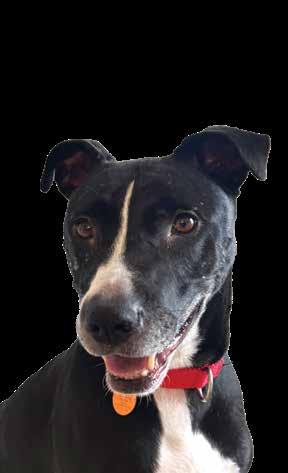 By Kidareo Bayer-Carlos, Adoption Coordinator
By Kidareo Bayer-Carlos, Adoption Coordinator
After 168 days in our care Frankie, one of our resident dogs, finally found his perfect match and officially went home in January. Frankie’s adopters have been involved with Animal Friends for a couple of years after one of their daughters adopted a cat and they began volunteering.
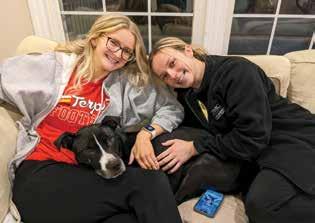
At the end of December, they came in to make a donation to our Chow Wagon Pet Food Bank and decided to take a look at the dogs on our Adoption Floor. They had recently lost their 10-year-old dog, Sadie, due to a series of medical issues and were finally ready to start the next chapter of their lives with another dog who they could share their love with. As soon as they saw Frankie, it was love at first sight!
THINKING OUTSIDE THE CAGE
And the way Frankie looked back at them reminded them so much of their first dog, Hogan, who they adopted almost 25 years ago to the date that they truly felt it was meant to be. After their meet and greet, Frankie’s new adopters were stunned to learn that he had been with us for as long as he had, because he seemed like the perfect dog to them in every way.
To top things off, Frankie ended up being our very first adoption of the new year making it an even more special occasion for all of us!
Once home, Frankie’s new adopters decided to rename him to Ripley, believe it or not! During Ripley’s first couple of hours at home, he went from room to room and window to window, exploring everywhere in this brand new and exciting environment. He has been showing off his wonderful manners in his new home and absolutely loves to take naps on the family sofa. Ripley, being the curious and energetic guy that he is, also loves going on long walks to explore his new neighborhood. He has even developed a new talent that he loves to show off to all his friends where he can perform an array of musical numbers through snorting – he’s a pretty talented guy if we do say so ourselves!
Beyond his very inquisitive nature, Ripley’s adopters love to spoil him with toys and snuggles because he deserves it! He has brought a whole lot of love into their lives, becoming an inseparable member of the family. Ripley loves to meet new people, especially his extended family and friends. It may have taken some time, but Ripley finally found his family, and we hope that all of our residents can experience similar love stories, as everyone deserves to find happiness like this.
NONPROFIT ORG US POSTAGE PD Pittsburgh, PA PERMIT NO. 602
“
Ripley’s adopters love to spoil him with toys and snuggles because he deserves it! He has brought a whole lot of love into their lives, becoming an inseparable member of the family.”






























 By Dr. Donald Consla, Lead Wellness Veterinarian
By Dr. Donald Consla, Lead Wellness Veterinarian


 By Jay Bradshaw, Animal Friends Volunteer
By Jay Bradshaw, Animal Friends Volunteer















 By Cecilia Oliveros, Community Resource Coordinator
By Cecilia Oliveros, Community Resource Coordinator













































































 By Kidareo Bayer-Carlos, Adoption Coordinator
By Kidareo Bayer-Carlos, Adoption Coordinator
